Basic Britain: baked beans
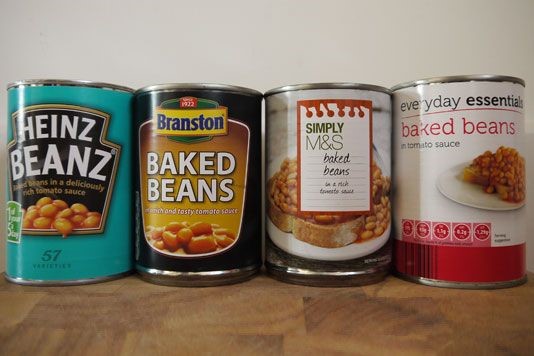
In her hardest `Basic Britain' assignment yet, Laura Rowe investigates what really goes inside a tin of baked beans.
OK, I’ll just come out and admit it. This is the one feature I’d been dreading. It’s not even that I just don’t like them but baked beans actually scare me. It’s a combination of the way they smell, their unpleasant overcooked “bitty” texture, the fact they glimmer menacingly within their amber slime, and that seemingly move of their own accord. Certain university flatmates used to place rogue beans around our communal kitchen just to freak me out. I think it was perhaps this advert that cemented my phobia of this frightening food stuff. And before you scoff, I’m not the only one. So this time, I’ll be doing all the “journalism” bits but enlisting the help of a willing volunteer to do all of the taste tests. We looked at two popular brands and two budget alternatives:
- The UK’s number one provider of baked beans – Heinz baked beans 69p/415g
- Branston Baked Beans 69p/410g
- Simply M&S Baked Beans 39p/410g
- Aldi Everyday Essentials Baked Beans 26p/420g
The can
Like the tinned tomatoes I looked at previously, there is very little difference between what contains these little fiends – sorry, beans. Each of the cans are recyclable and each are wrapped in a colour label. Heinz does have a pull-ring.
The beans
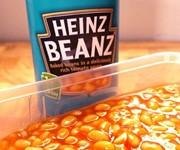 Most traditional baked bean recipes call for haricot beans, which, just to clarify, I have no problem with, and this is indeed what you’ll find in our four tins. In an average Heinz tin you’ll find some 465 beans, which are grown in the US and Canadian Great Lakes area where “the climate is just right”. Branston’s tin features 430 beans, although its team couldn’t tell me where they are sourced from, except to say “from a variety of specially selected locations”. M&S says its cans have approximately 430 beans, which are grown in North America. Aldi couldn’t give me any information on its product other than what was on the label.
Most traditional baked bean recipes call for haricot beans, which, just to clarify, I have no problem with, and this is indeed what you’ll find in our four tins. In an average Heinz tin you’ll find some 465 beans, which are grown in the US and Canadian Great Lakes area where “the climate is just right”. Branston’s tin features 430 beans, although its team couldn’t tell me where they are sourced from, except to say “from a variety of specially selected locations”. M&S says its cans have approximately 430 beans, which are grown in North America. Aldi couldn’t give me any information on its product other than what was on the label.
What else is in there?
Each of the beans are of course coated in that infamous tomato sauce (how do you season yours? Do you add a pinch of garam masala and sliced chilli, or perhaps garlic and paprika? Let us know in the comments box 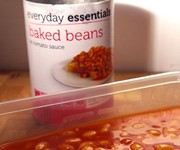 below). M&S and Branston have surprisingly similar ingredients with 32% and 37% (respectively) tomatoes, water, sugar, salt, dried onions, paprika and spices. M&S also contains cornflour starch, vegetable oils and garlic oil but no preservatives. Branston has modified maize starch and again no preservatives – it keeps its beans fresh by sealing the cans and then heat-treating them. Aldi’s tin only features 6% tomato purée in its ‘tomato sauce’ along with glucose-fructose syrup and sugar, water, modified maize starch, salt, onion powder and paprika. Heinz has 34% tomatoes, which it says are sourced from southern Mediterranean countries such as Spain and Portugal, water, sugar, modified cornflour, spirit vinegar, salt, spice and herb extracts. It too doesn’t use any preservatives, or artificial colours or flavours but relies on the product being sealed in a can and cooked at a high temperature.
below). M&S and Branston have surprisingly similar ingredients with 32% and 37% (respectively) tomatoes, water, sugar, salt, dried onions, paprika and spices. M&S also contains cornflour starch, vegetable oils and garlic oil but no preservatives. Branston has modified maize starch and again no preservatives – it keeps its beans fresh by sealing the cans and then heat-treating them. Aldi’s tin only features 6% tomato purée in its ‘tomato sauce’ along with glucose-fructose syrup and sugar, water, modified maize starch, salt, onion powder and paprika. Heinz has 34% tomatoes, which it says are sourced from southern Mediterranean countries such as Spain and Portugal, water, sugar, modified cornflour, spirit vinegar, salt, spice and herb extracts. It too doesn’t use any preservatives, or artificial colours or flavours but relies on the product being sealed in a can and cooked at a high temperature.
How do they taste?
Over to my taste test panel... Lisa judged each beans on smell, look, bean size and texture and taste. Heinz was the lightest in colour and had the highest density of beans. She said it had a distinctive smell, from its spices, and a rich, thick (but quite sweet) sauce. The beans were mostly whole but quite soft. Simply M&S was Lisa’s favourite, with the “best flavour”. The beans were a bit smaller, had good bite but too much sauce. Branston had consistently sized, firm beans but the sauce was too thick, almost “congealed” and Lisa felt there was a slight after taste. Aldi beans varied wildly in size, some were quite battered and broken and there were several skins of beans floating around the sauce. Lisa felt they were overcooked and too soft, while the sauce was very sweet, with a “fleeting flavour”.
Beanz means healthy?
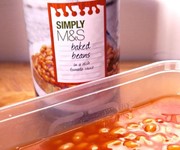 Baked beans are seen by many as a healthy meal choice – indeed Branston’s tagline on its can is that “baked beans are a good source of fibre, low in fat and are great as part of a balanced everyday diet” and the Heinz can says it is “low sugar, low fat, high fibre” and that “just 1/4 of the can equals one of your five a day”. But what of their salt and sugar content? The GDA salt intake for an adult is 6g and 4g for children aged 5-10 years; sugar is 90g for a woman, 120g for a man, and 85g for children.
Baked beans are seen by many as a healthy meal choice – indeed Branston’s tagline on its can is that “baked beans are a good source of fibre, low in fat and are great as part of a balanced everyday diet” and the Heinz can says it is “low sugar, low fat, high fibre” and that “just 1/4 of the can equals one of your five a day”. But what of their salt and sugar content? The GDA salt intake for an adult is 6g and 4g for children aged 5-10 years; sugar is 90g for a woman, 120g for a man, and 85g for children.
Earlier this year Heinz completed a programme to ensure that its range of baked beans met the Department of Health Responsibility Deal 2012 voluntary salt targets (point 7) while maintaining “the great taste consumers prefer”. Heinz salt content is 0.6g per 100g and sugar content is 5g, although it also offers reduced sugar and salt varieties. It is also vegetarian and gluten free. Branston, which came top in this taste test, has 5.9g sugar per 100g beans and 0.8g of salt. It (and Simply M&S) is suitable for vegetarians and vegans, and Branston has a reduced sugar and salt variety. Simply M&S has 3.7g of sugar per 100g beans and 0.65g of salt, while Aldi Everyday Essentials has 4.5g of sugar and 0.61g salt. Interestingly it is only Branston and Aldi Everyday Essentials that clearly labels this information on the front of the can and what it means in terms of percentages.
Where are they packed?
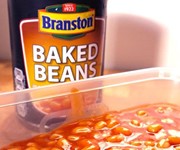 While the beans have to be sourced outside of the UK, admirably they are all made here in the UK. Heinz beans are made near Wigan, Branston beans are packed in Long Sutton and Wisbech, Simply M&S in East Anglia. So how can we account for the wide variety in price? Heinz justifies its price because “we are number one at the checkout because [the beans] provide great taste, quality and nourishment as well as great value”. Branston, which occupies a 17% market share (in terms of volume), says its price is down to “taste and quality”. Simply M&S is produced as cheaply as it is as “labels/trays and film are sourced as economically as possible”. Aldi Everyday Essentials couldn’t give me any information.
While the beans have to be sourced outside of the UK, admirably they are all made here in the UK. Heinz beans are made near Wigan, Branston beans are packed in Long Sutton and Wisbech, Simply M&S in East Anglia. So how can we account for the wide variety in price? Heinz justifies its price because “we are number one at the checkout because [the beans] provide great taste, quality and nourishment as well as great value”. Branston, which occupies a 17% market share (in terms of volume), says its price is down to “taste and quality”. Simply M&S is produced as cheaply as it is as “labels/trays and film are sourced as economically as possible”. Aldi Everyday Essentials couldn’t give me any information.
So, does beans means Heinz for you? Or do you go budget? Let us know in the comments box below.
Comments
Be the first to comment
Do you want to comment on this article? You need to be signed in for this feature